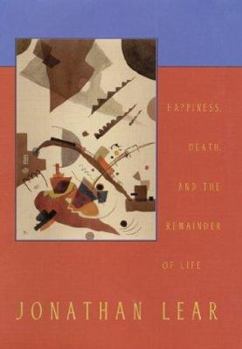Happiness, Death, and the Remainder of Life
(Part of the The Tanner Lectures on Human Values Series)
Select Format
Select Condition 
Book Overview
Separated by millennia, Aristotle and Sigmund Freud gave us disparate but compelling pictures of the human condition. But if, with Jonathan Lear, we scrutinize these thinkers' attempts to explain human behavior in terms of a higher principle--whether happiness or death--the pictures fall apart. Aristotle attempted to ground ethical life in human striving for happiness, yet he didn't understand what happiness is any better than we do. Happiness became an enigmatic, always unattainable, means of seducing humankind into living an ethical life. Freud fared no better when he tried to ground human striving, aggression, and destructiveness in the death drive, like Aristotle attributing purpose where none exists. Neither overarching principle can guide or govern "the remainder of life," in which our inherently disruptive unconscious moves in breaks and swerves to affect who and how we are. Lear exposes this tendency to self-disruption for what it is: an opening, an opportunity for new possibilities. His insights have profound consequences not only for analysis but for our understanding of civilization and its discontent.
Format:Hardcover
Language:English
ISBN:0674003292
ISBN13:9780674003293
Release Date:September 2000
Publisher:Harvard University Press
Length:189 Pages
Weight:0.95 lbs.
Dimensions:0.8" x 5.9" x 8.5"
Customer Reviews
3 ratings
A refreshing look into Aristotle and Freud
Published by Thriftbooks.com User , 24 years ago
First, to appreciate this book you have to be intimately acquainted with the later Freud and Aristotle's Nichomachean Ethics. Lear's book is a copy of the Tanner Lectures that he gave to an audience at Cambridge University, so it is, unlike some of Lear's other works, quite academic.If this doesn't bother you, then you're in for a real treat. Lear uses the tools of psychoanalysis (in a reasonable fashion, thankfully) to pick apart Freud's postulation of the death instinct, and Aristotle's decree that happiness is the highest good.I was particularly impressed with his analysis of how guilt may have been a factor in both Freud and Aristotle's shaky attempts to base their theories on a single, all encompassing principle that gives life a teleological meaning.
Satisfying consideration of Aristotle and Freud
Published by Thriftbooks.com User , 24 years ago
Lear is both a philosopher and a psychoanalyst. The pleasure in this short book comes as he keenly applies the skills of each discipline to thinkers, Aristotle and Freud, who are not usually tested by both disciplines. It is a pleasure to read a psychoanalytic critique of Aristotle and a philosophical critique of Freud. Unfortunately, Lear, while a capable critic, does not, in this book anyway, succeed in providing a robust alternative view. In any case, this book is quite accessible to the reader not deeply versed in either Aristotle or Freud's writings. Lear first elucidates a critical, unresolved tension in Aristotle's ethics. Aristotle spends most of the Nichomachean Ethics focusing on the satisfaction to be gained from living an active life of "the traditional ethical virtues informed by practical wisdom." But at the end of the Nichomachean Ethics, according to Lear, Aristotle switches course and now posits the contemplative life as the exemplary, though ultimately never fully achievable, life. It is this sudden switch that Lear focuses on. Lear argues that this switch occurs because Aristotle realizes that there is something incomplete in the premise on which he built the majority of the Nichomachean Ethics. Lear explains from a psychoanalytic perspective this was the bubbling up of Aristotle's anxiety about the unanswered questions in his ethical analysis.As for Freud, Lear focuses first on the weakness of Freud's evidence for the death instinct. This is nothing new, as the death instinct is clearly a broad step beyond Freud's earlier, more nuanced theorizing. But then Lear goes on to argue that Freud's need to provide a comprehensive explanation of aggression is what drove Freud to posit the death instinct. According to Lear, it was Freud's avoidance of ambiguity that motivated the death instinct reasoning. Lear is compelling here, and is probably pointing out an implicit desire in most people's thinking for "an answer." But Lear's alternative hypothesis of the "open minded" solution left me feeling a little empty. Lear would probably argue that that is because I have an irrational need for a complete story; still, the absence of real meat around Lear's conception makes the essay less than brilliant. Lear provides a wonderful teasing out of weaknesses in Aristotle and Freud's thinking about ultimate goals. As for Lear's own resolution of the issues that he feels are unresolved by Aristotle and Freud, they are less than complete and satisfying. Lear finds fault with any complete, teleological resolution of what it means to "live a good life." The result is a disappointing "non-answer" which Lear would probably argue is the best we can do. Worth buying, worth reading, but not a book that will change your life.
Great Book
Published by Thriftbooks.com User , 24 years ago
I thought this was an excellent book. It was highly informative and written for the layman. It mixed philosophy and psychoanalysis beautifully, and I would recommend it to anyone. In addition, as John's brother, I can tell you he know's what he's talking about!






